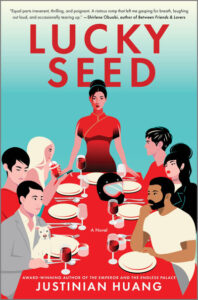The Sun family seems to have everything—a multi-squillion dollar empire, homes and compounds in prime California real estate and no shortage of power, influence, notoriety and fame. But the one thing access to the Sun family trust requires is the one thing the family doesn’t have: a male heir. But some members of the Sun clan have plans to change this and soon there is a race to see which grandchild can first produce a male heir.
Justinian Huang’s Lucky Seed tells the story of the Sun clan, exploring themes of culture and tradition, male lineage and what it means to be a family. Told from multiple perspectives, Huang moves at a pace—and at a lifestyle—that will no doubt remind readers of Crazy Rich Asians and some of the other similarly styled novels, films and television shows (the marketing materials describe the book as Crazy Rich Asians meets Succession) that have since followed.

The need for a male heir is prompted by family matriarch Roses. Roses assumed the reins of the business following her father’s death and now she’s looking to unlock the family trust thinking that her gay nephew Wayward is her best hope. Wayward is reluctant, but Roses bribes him with the family trust, setting off a chain of events that sees different family members wanting to see how they might secure the fortune for themselves.
Roses, who is both traditionally fierce and fearful, is reliant on Master Chu, her personal fortune teller. Consulting Master Chu daily, Roses begins to panic when her plan to have her nephew, Wayward, produce a male heir is under threat. But Master Chu is quick to respond.
Roses was practically thrashing her phone in panic. The Sunfang Trust is in danger until we produce an heir! Should we move on from Waward? Should we try April again?
No! The response was abrupt and resolute. The Sun Clan lineage must perpetuate through Wayward. It is he who possesses the lucky seed! My dear Mrs. Sun, it is Wayward… or disaster!
Roses has three younger siblings—George, who might have been running the Sun family empire had he not opted out decades earlier, and younger sisters Iris and Hyacinth. Each sister has been given a distinct role to play in the family drama.
But also like the unlucky canary, Hyacinth often fell victim to these plots before she could elude them. Whereas Roses was the obelisk and Iris the sphinx, their little sister Hyacinth was Cleopatra, a doomed beauty constantly stuck in the middle of their power struggles.
The children’s daughters and sons (only Roses’s daughter April has a child; also, a girl) were once close but the cousins have drifted apart as adults, each having different allegiances and alliances and reasons for having fallen out.
Huang does well to introduce his ensemble cast to the reader. The opening chapters move through a number of settings, situating particular characters on their home turfs. The rapid scenes provide momentum, while establishing family factions and beginning the reveal of each character’s backstory and motivations.
Everyone knew that Auntie Iris was clever, but she was also an unknowable wildcard, and April had learned early in life to choose words wisely in her presence. At the same time, April had always believed that her alliance with Iris would prove fruitful someday at a pivotal moment.
Huang shows off the family’s seemingly infinite extravagance, but also each character’s weak spots. Family members try to exploit vulnerabilities and secrets, but Huang also gives his characters opportunities for introspection and for them to overcome their own weaknesses. The story has an element of redemption that adds a nice layer of complexity to all of the lavishness.
Lucky Seed looks at tradition, culture and also stereotypes. There’s a scammy fortune teller that might remind readers of a true story. There’s the elevation of male family members over female family members and the idea of male lineage, a practice that is still far too prevalent today. But mostly, Huang is describing a “web” of relationships that, stripped of the wealth, might feel actually quite relatable. As Lola (youngest daughter of George) describes: “They were not a family, but a web. Some of them were flies, and others were spiders.”
Huang mixes in humour, sex, drugs and influencer culture and the novel feels both fun and funny. There are enough characters for everyone to find someone to cheer for and while some of the plot twists are predictable, Huang neatly takes his readers on an adventure.


You must be logged in to post a comment.